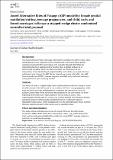| dc.contributor.author | Esho, Tammary C. | |
| dc.contributor.author | Scholten, Julia | |
| dc.contributor.author | Conradi, Hilke | |
| dc.contributor.author | Kawai, David | |
| dc.contributor.author | Mbogo, Bernard | |
| dc.contributor.author | Lugayo, Denge | |
| dc.contributor.author | Opanga, Yvonne | |
| dc.contributor.author | Muhula, Samuel | |
| dc.contributor.author | Matanda, Dennis Juma | |
| dc.date.accessioned | 2023-07-19T07:15:25Z | |
| dc.date.available | 2023-07-19T07:15:25Z | |
| dc.date.issued | 2023 | |
| dc.identifier.uri | https://repository.amref.ac.ke/handle/20.500.14173/846 | |
| dc.description.abstract | The Amref Alternative Rites of Passage (ARP) model was initiated in 2009. To date, about 20,000 girls have been supported by their communities to denounce female genital mutilation/cutting (FGM/C) and graduate into ‘maturity’ through ARP. While this intervention has been implemented for decades, there is limited evidence of its effectiveness in ending FGM/C. In order to ascertain the effectiveness of this intervention, Amref has developed a digital tracking tool to follow up on girls who have and haven’t gone through the ARP. The key research question is: what effect does ARP have on incidences of FGM/C, teenage pregnancy and child, early and forced marriages among adolescent girls and young women? | en_US |
| dc.language.iso | en | en_US |
| dc.subject | Female Genital Mutilation--Cutting | en_US |
| dc.subject | Alternative Rites of Passage | en_US |
| dc.subject | Alternative Rites of Passage, Nairobi, Kenya | en_US |
| dc.title | Amref Alternative Rites of Passage (ARP) model for female genital mutilation/cutting, teenage pregnancies, and child, early and forced marriages in Kenya: | en_US |
| dc.title.alternative | a stepped-wedge cluster randomised controlled trial protocol | en_US |
| dc.type | Article, Journal | en_US |

